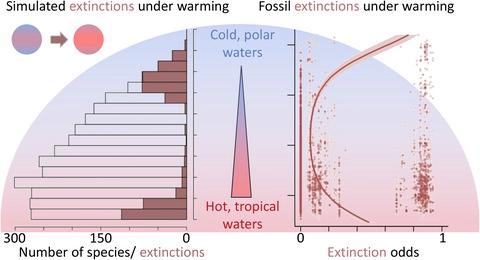当前位置:
X-MOL 学术
›
Glob. Change Biol.
›
论文详情
Our official English website, www.x-mol.net, welcomes your feedback! (Note: you will need to create a separate account there.)
Global warming generates predictable extinctions of warm- and cold-water marine benthic invertebrates via thermal habitat loss
Global Change Biology ( IF 11.6 ) Pub Date : 2022-07-19 , DOI: 10.1111/gcb.16333 Carl J Reddin 1, 2 , Martin Aberhan 1 , Nussaïbah B Raja 2 , Ádám T Kocsis 2, 3
Global Change Biology ( IF 11.6 ) Pub Date : 2022-07-19 , DOI: 10.1111/gcb.16333 Carl J Reddin 1, 2 , Martin Aberhan 1 , Nussaïbah B Raja 2 , Ádám T Kocsis 2, 3
Affiliation

|
Anthropogenic global warming is redistributing marine life and may threaten tropical benthic invertebrates with several potential extinction mechanisms. The net impact of climate change on geographical extinction risk nevertheless remains uncertain. Evidence of widespread climate-driven extinctions and of potentially unidentified mechanisms exists in the fossil record. We quantify organism extinction risk across thermal habitats, estimated by paleoclimate reconstructions, over the past 300 million years. Extinction patterns at seven known events of rapid global warming (hyperthermals) differ significantly from typical patterns, resembling those driven by global geometry under simulated global warming. As isotherms move poleward with warming, the interaction between the geometry of the globe and the temperature-latitude relationship causes an uneven loss of thermal habitat and a bimodal latitudinal distribution of extinctions. Genera with thermal optima warmer than ~21°C show raised extinction odds, while extinction odds continually increase for genera with optima below ~11°C. Genera preferring intermediate temperatures generally have no additional extinction risk during hyperthermals, except under extreme conditions as the end-Permian mass extinction. Widespread present-day climate-driven range shifts indicate that occupancy loss is already underway. Given the most-likely projections of modern warming, our model, validated by seven past hyperthermal events, indicates that sustained warming has the potential to annihilate cold-water habitat and its endemic species completely within centuries.
中文翻译:

全球变暖通过热栖息地丧失导致可预测的温水和冷水海洋底栖无脊椎动物灭绝
人为的全球变暖正在重新分配海洋生物,并可能以几种潜在的灭绝机制威胁热带底栖无脊椎动物。然而,气候变化对地理灭绝风险的净影响仍然不确定。化石记录中存在广泛的气候驱动灭绝和潜在未知机制的证据。我们量化了过去 3 亿年通过古气候重建估计的热栖息地的生物灭绝风险。七个已知的全球快速变暖(过热)事件的灭绝模式与典型模式显着不同,类似于在模拟全球变暖下由全球几何驱动的模式。随着等温线随着变暖而向极地移动,地球的几何形状和温度-纬度关系之间的相互作用导致热栖息地的不均匀丧失和灭绝的双峰纬度分布。最适温度高于~21°C的属显示灭绝几率增加,而最适温度低于~11°C的属的灭绝几率不断增加。偏爱中间温度的属通常在高温期间没有额外的灭绝风险,除非在极端条件下,如二叠纪末大规模灭绝。目前广泛的气候驱动范围变化表明入住率损失已经在发生。鉴于现代变暖最有可能的预测,我们的模型经过七次过去的高温事件验证,
更新日期:2022-07-19
中文翻译:

全球变暖通过热栖息地丧失导致可预测的温水和冷水海洋底栖无脊椎动物灭绝
人为的全球变暖正在重新分配海洋生物,并可能以几种潜在的灭绝机制威胁热带底栖无脊椎动物。然而,气候变化对地理灭绝风险的净影响仍然不确定。化石记录中存在广泛的气候驱动灭绝和潜在未知机制的证据。我们量化了过去 3 亿年通过古气候重建估计的热栖息地的生物灭绝风险。七个已知的全球快速变暖(过热)事件的灭绝模式与典型模式显着不同,类似于在模拟全球变暖下由全球几何驱动的模式。随着等温线随着变暖而向极地移动,地球的几何形状和温度-纬度关系之间的相互作用导致热栖息地的不均匀丧失和灭绝的双峰纬度分布。最适温度高于~21°C的属显示灭绝几率增加,而最适温度低于~11°C的属的灭绝几率不断增加。偏爱中间温度的属通常在高温期间没有额外的灭绝风险,除非在极端条件下,如二叠纪末大规模灭绝。目前广泛的气候驱动范围变化表明入住率损失已经在发生。鉴于现代变暖最有可能的预测,我们的模型经过七次过去的高温事件验证,



























 京公网安备 11010802027423号
京公网安备 11010802027423号